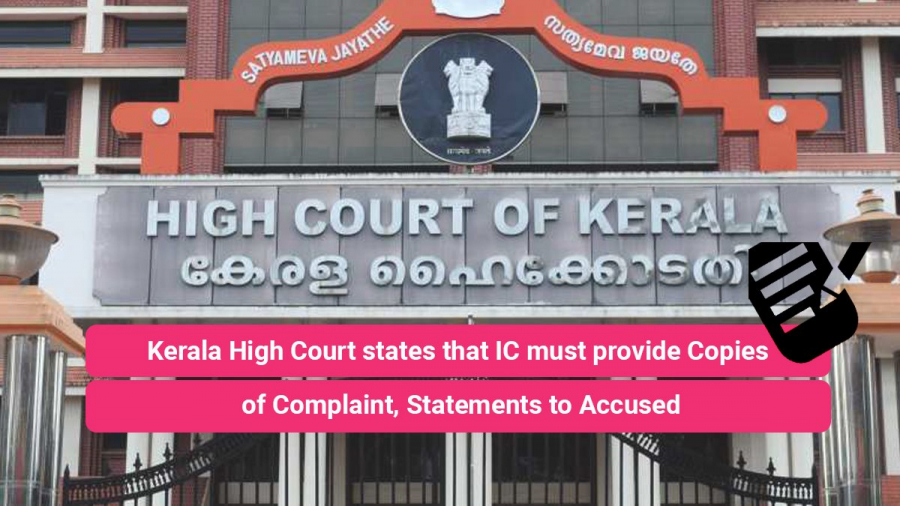On 10th January 2022, in the case of Managing Director, HDFC Standard Life Insurance Company v. Suresh Babu, (“Case”), it was held by the High Court of Kerala that while cross-examination of witnesses may not be necessary during sexual harassment proceedings, however, the accused must be provided with copies of the complaint, documents and statements filed.
Facts:
- Six employees of the HDFC Standard Life Insurance Company (“Company”) submitted a complaint by email to their Manager against an employee of the Company (“Respondent”) for offences committed under the Sexual Harassment of Women at Workplace (Prevention, Prohibition and Redressal) Act, 2013 (“POSH Act”). They also submitted a written complaint which was forwarded to the Internal Committee (“IC”) constituted under the POSH Act.
- The IC gave a hearing to the Respondent who filed his written statement. The Inquiry Report submitted by the IC noted that the Respondent did make sexually-colored remarks towards the complainant and recommended his termination from the Company.
- The Company then terminated the service of Respondent on the basis of these recommendations.
- The Respondent filed an appeal to the Regional Joint Labor Commissioner (“Commissioner”), the appellate authority notified under Section 2(a) of the Industrial Employment (Standing Orders) Act read with Section 18 of the POSH Act. Here, IC report was set aside and the complaint was remanded to the IC for a detailed inquiry. The Commissioner stated that report was vitiated as the Company did not submit details of the IC to Commissioner and the statements of the witnesses and documentary evidence to the Respondent.
- Being aggrieved with the order, the Company filed the present writ petition.
Issues:
- Whether the IC Report stood invalidated because the Accused did not receive copies of the complaint, statements or evidence.
- Whether the IC is bound by the POSH Act and POSH Rules to cross-examine the complainants and witnesses
Arguments:
The following arguments were submitted by the counsel for the Company:
- The dignity and equality of women is the main concern of the POSH Act and it is completely silent on the aspect of cross examination of either of the parties by the employer. The concept of natural justice has to be within the confines of the Act and while Section 11 provides the parties the right to be heard, it does not include the right to cross-examine witnesses.
- It has been held by the Hon’ble Supreme Court in Hira Nath Mishra v. The Principal Rajendra Medical College, Ranchi (1973) that rules of natural justice cannot be applied to all conditions in the same way. Hence, it was not necessary to record the statements of the complainants in front of the Respondent and cross-examination of the witnesses is not the only way to conduct an inquiry. The counsel relied on the judgment of Sibu L.S. v. Air India (2016) (“Air India case”) to argue that if the individual had received fair treatment in the case against him, the Court could not substitute its judgment for that of the Administrative Authority.
The counsel for the Respondent submitted the following arguments:
- Rule 7 (2) of the POSH Rules mandates that a copy of the complaint is to be served to the accused and Sections 11 and 13 of the POSH Act mandate that a report of the IC findings also has to be provided to the accused. According to these provisions, the IC inquiry has to go by the principles of natural justice.
- The Respondent was not allowed to cross-examine the witnesses so the Commissioner was right to interfere with the inquiry and remand the matter to the IC.
Observation of the court on Issue 1–
The Kerala High Court observed that keeping in mind the various provisions and the Air India case, the IC inquiry was not according to the POSH Act and the POSH Rules and the Commissioner was right in setting aside the inquiry report. It is mandatory to furnish the copy of the findings of IC to both the parties otherwise it would be a breach of the principles of natural justice. While it is true that the principles of natural justice are flexible and may differ in different circumstances, fairness on part of the authority is required. The accused should know the evidence that has been put on record and he should be given a fair opportunity to correct and contradict the statements made.
Observation of the court on Issue 2-
The Court did not agree with the claim that the findings were vitiated because the witnesses were not cross-examined in front of the Respondent. However it said that instead of a denova inquiry, the IC must conduct a further inquiry, taking into account all evidence already submitted since considerable time had passed since the incident and a fresh inquiry would be a further ordeal for the complainants.
Final Judgment– The Court ordered for the IC report to be set aside and for the case to be remitted for further inquiry instead of a denova inquiry. It said that Respondent should be provided with copies of the complaint and the documents filed. However, it said that there was to be no verbal cross-examination of the complainants/witnesses unless all of them consented to it. The Respondent was also to be placed on suspension till this order was complied with.
– Rhea Bazaz, Final Year Student, Symbiosis Law School, Pune
 Cart is empty
Cart is empty 

